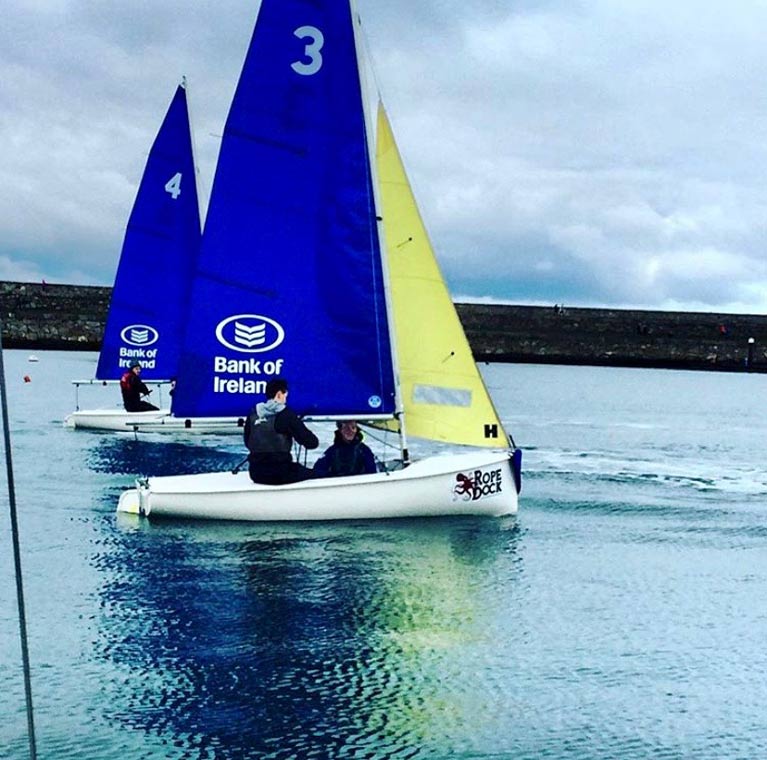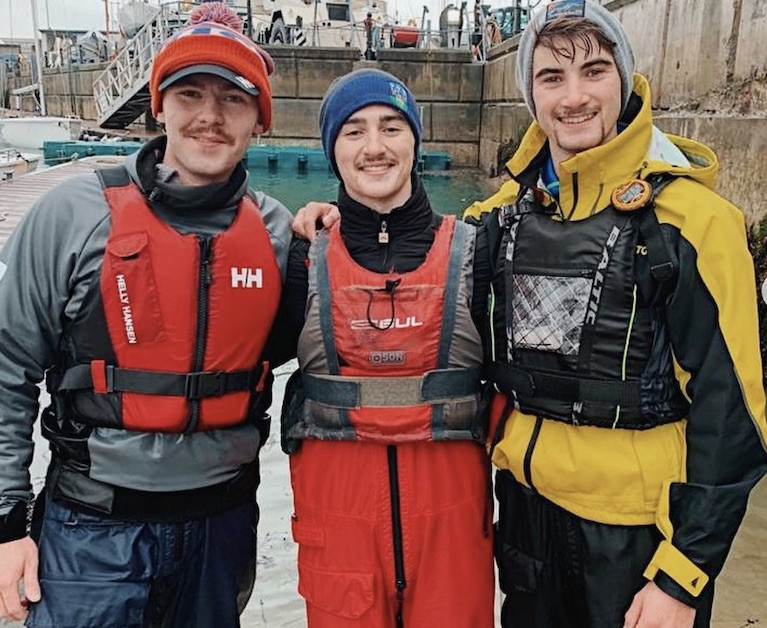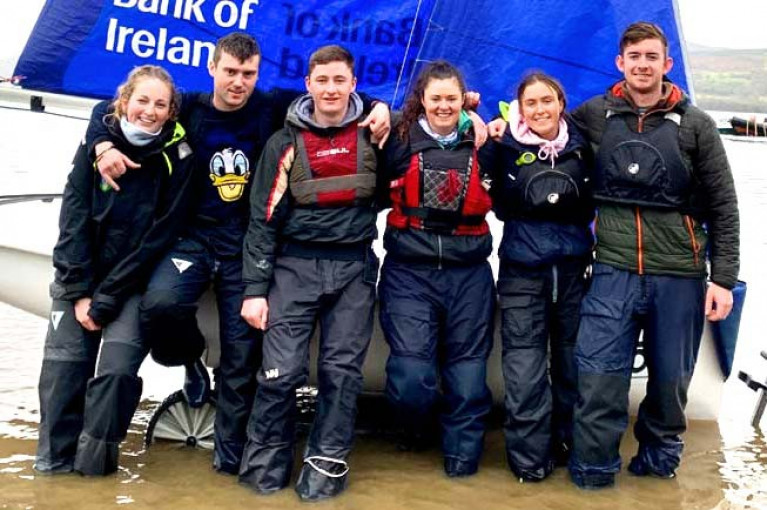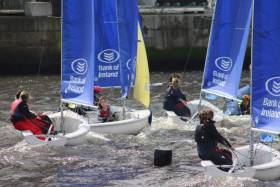Displaying items by tag: UCD Sailing Club
UCD Sailing Club Launch Annual 'Movember' Campaign
UCD Sailing Club has launched its annual 'Movember' campaign for the third consecutive year writes the club's Lucy Reid
Although we’re not able to have our club members out on the water and fundraising like we normally do, we are finding ways to come together while staying apart.
In the last two years, UCDSC has successfully raised over €4,000 for the Movember charity, a charity that focuses on men’s health, something that is especially close to our hearts.
As per usual our boys our preparing to grow a mo and look ridiculous for the next month. For those who can’t, this year we have brought in two additional challenges. UCD Sailing is going to Move for Movember! Members are going to walk/run 60km each throughout November. Why 60km? Because the world loses 60 men to suicide each hour, every hour.
Our second challenge is to have a UCD SC member embracing the cold and diving into the icy cold water every day across Ireland. This is for those of us who are lucky enough to live within 5km of the water and will swim to raise awareness for mental health.
Unfortunately, as the times demand at the moment our annual Sail and Shave or Save the Stache event in Dun Laoghaire cannot go ahead on December 1st. This would have involved alumni and friends of the club and as a fundraiser will be a hard loss to our campaign.
It may seem like another world now, but the energetically-organised Irish Inter-varsities team racers managed to get in their 2020 Championship early in March before the Covid-19 clampdown closed in. The venue was University of Limerick’s watersports facility at Killaloe on Lough Derg, and in three decidedly hectic days of Firefly racing, University College Dublin Firsts emerged as overall winners. Their Sailing Captain is Daniel Raymond, so he gets the nod as our Team Racer of the Month, but it’s all about team effort, and the complete lineup was Jack Higgins, Daniel Raymond and Patrick Cahill as helms, while crews were Alanna Lyttle, Kathy Kelly and Lucy McCutcheon, with Lucy McCutcheon (winner in 2019) taking the Irish Universities Sailing Association “Crew of the Year” title
UCD Sailing Club Triumph at Intervarsity Champs on Lough Key
UCD Sailing Club has won Irish University Sailing Association (IUSA) team racing Inter-Varsities 2019.
They beat Trinity Sailing in a nail-biting semi-final and moved to face UCC in the final. After two extremely competitive races, UCD came out on top, winning gold.
The team consisted of helms Jack Higgins, Patrick Cahill, Daniel Raymond and crews Alanna Lyttle, Lucy McCutcheon and Katie Cassidy.
As well as winning gold UCD were also awarded IUSA Club of the Year. UCD Commodore Lucy McCutcheon was also awarded IUSA Captain of the Year.
 Students at the 2019 intervarsity championships held on Lough Key
Students at the 2019 intervarsity championships held on Lough Key
UCD would like to thank the organising college Trinity Sailing for an impressive event at Lough Key near Carrick-on-Shannon for over 250 competitors.
UCD have qualified for BUSA Team Racing National Championships in England next month.
The next event is UCD Vs Trinity Colours match and will be held on the 6th of April. UCD Sailing Club is sponsored by Bank of Ireland.

UCD Sailing Alumni & Friends Event At National YC This February
The National Yacht Club will host UCD Sailing Club’s second Alumni and Friends Regatta on Saturday 2 February.
The event will involve a team racing round robin in the NYC’s Firefly dinghies, followed by a three-course dinner in the clubhouse.
All are welcome to join in the day’s events regardless of your alma mater.
UCD Students Third in Yachting World Cup
UCD Sailing Club has finished third overall at the Student Yachting World Cup in France. The week long regatta counted about 150 competitors, representing 15 countries from all around the world.
The Student Yachting World Cup (SYWoC) is an event organised every year in France by students for students.
As Afloat.ie reported previously, UCD returned for the fourth time in a row and as previous winners from 2012.
Created in 1979 under the name of Course de l'Europe, the cup was just meant for participants from Western Europe. But, as time went by, more and more Eastern European countries joined the cup. That's why the Course de l'Europe changed its name to become the SYWoC.
Final results:
1. Ecole Polytechnique Federale de Lausanne, SUI, 27.0 points
2. University of Southampton, ENG, 30.0
3. University College Dublin, IRL, 45.0
4. University of Cambridge, ENG, 59.0
5. Dalhousie University, CAN, 73.0
6. Kobe University, JPN, 89
7. University of Strathclyde, SCO, 91.0
8. University of Oxford , ENG, 107.0
9. BI Norwegian Business School, NOR ,109.0
10. Ecole Polytechnique, FRA, 135.0
Trinity & UCD Contest Student Yachting World Cup
Two Dublin University Sailing teams are competing in this week's 35th edition of the Student Yachting World Cup (SYWoC) that began in France today. Both Dublin University (Trinity) and UCD Sailing Clubs return to France for the highlight of the Student sailing calendar. UCD return for the fourth time in a row and as previous winners from 2012. Trinity earned the invite to La Baule – Le Pouliguen in recognition of its 'consistent performance at Student Yachting Nationals' as well as being 2006 Cup holders.
This year’s event will be sailed using J80’s and involves a coastal leg along with the scheduled inshore races.
Up to 20 teams are taking part including the University of Southampton (England), the Ecole polytechnique fédérale de Lausanne (Switzerland), and the University of Brescia (Italy).
The event has been taking place since 1979 and is seen as the most prestigious keelboat competition in the student sailing calendar.
The UCD team for this year consists of Ryan Glynn (Skipper), Ronan Jones, Colin O’Mahoney, Cliodhna Conolly, Cian Cahill and Emma Reidy.
































































